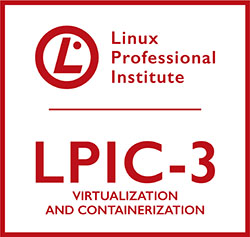305-500

| Formats: | Asynchronous |
| Blended | |
| Online | |
| Onsite | |
| Part-time | |
| Level: | Advanced |
| Prerequisites: | |
| Recommended Knowledge | |
| Active LPIC-2 certification | |
| Strong experience with Linux system administration and networking. | |
| Basic familiarity with virtualization or container concepts. | |
| LPIC2 202 - Linux Professional Institute | |
Formats: We offer our training content in a flexible format to suit your needs. Contact Us if you wish to know if we can accommodate your unique requirements.
Level: We are happy to customize course content to suit your skill level and learning goals. Contact us for a customized learning path.
LPIC305 (Virtualisation and Containerisation) - Linux Professional Institute Certification (305-500)
The LPIC-3 305 Virtualization and Containerization certification, offered by the Linux Professional Institute (LPI), is an advanced, vendor-neutral credential that validates expertise in planning, implementing, and managing virtualization and container-based infrastructure. As part of the LPIC-3 specialty track, it requires passing the LPIC-3 305 exam (exam code 305-500) and holding an active LPIC-2 certification. This course equips administrators with the skills to architect and troubleshoot virtualization solutions—whether on-premise or in the cloud—covering full virtualization with tools like Xen and QEMU, containerization with Docker and LXC, and deployment using cloud management platforms. It prepares you to manage your own Infrastructure as a Service (IaaS) environment with confidence.
Target Audience
This course is ideal for:
- Experienced Linux administrators seeking expertise in virtualization and containers.
- IT professionals pursuing the LPIC-3 Virtualization and Containerization certification.
- System engineers managing cloud or on-premise virtualized infrastructure.
- LPIC-2 certified individuals aiming to specialize in modern virtualization technologies.
Prerequisites
To succeed in this course, participants should have:
- Active LPIC-2 certification (required to earn LPIC-3).
- Strong experience with Linux system administration and networking.
- Basic familiarity with virtualization or container concepts (preferred but not mandatory).
What You Will Learn
In this course, you will gain expertise in:
- Managing full virtualization with Xen, QEMU, and libvirt for robust VM deployments.
- Implementing and troubleshooting container virtualization using LXC and Docker.
- Orchestrating containers with platforms like Docker Swarm and Kubernetes.
- Deploying and provisioning virtual environments using cloud tools like OpenStack and Vagrant.
Benefits of the Course
By completing this course, you will:
- Master the skills to design and maintain cutting-edge virtualization and container solutions.
- Be fully prepared to pass the LPIC-3 305-500 exam and earn a prestigious certification.
- Enhance your career prospects in the rapidly growing field of cloud and IaaS management.
- Gain hands-on expertise to troubleshoot and optimize virtualized infrastructure.
Course Outline
- Topic 351: Full Virtualization
- 351.1 Virtualization Concepts and Theory
Candidates will learn and understand the general concepts, theory, and terminology of virtualization, including Xen, QEMU, and libvirt terminology. - 351.2 Xen
Candidates will learn how to install, configure, maintain, migrate, and troubleshoot Xen installations. - 351.3 QEMU
Candidates will learn to install, configure, maintain, migrate, and troubleshoot QEMU installations. - 351.4 Libvirt Virtual Machine Management
Candidates will learn to manage virtualization hosts and virtual machines (‘libvirt domains’) using libvirt and related tools. - 351.5 Virtual Machine Disk Image Management
Candidates will learn to manage virtual machine disk images, including converting disk images between various formats and hypervisors and accessing data stored within an image.
- 351.1 Virtualization Concepts and Theory
- Topic 352: Container Virtualization
- 352.1 Container Virtualization Concepts
Candidates will understand the concept of container virtualization, including the Linux components used to implement it and using standard Linux tools to troubleshoot these components. - 352.2 LXC
Candidates will learn to use system containers with LXC and LXD (version 3.0 or higher). - 352.3 Docker
Candidates will learn to manage Docker nodes and containers, including understanding Docker’s architecture and its interaction with the node’s Linux system. - 352.4 Container Orchestration Platforms
Candidates will learn the importance of container orchestration and the key concepts Docker Swarm and Kubernetes provide to implement it.
- 352.1 Container Virtualization Concepts
- Topic 353: VM Deployment and Provisioning
- 353.1 Cloud Management Tools
Candidates will understand common offerings in public clouds and gain basic feature knowledge of widely available cloud management tools such as OpenStack and Terraform. - 353.2 Packer
Candidates will learn to use Packer to create system images, including running Packer in various public and private cloud environments and building container images for LXC/LXD. - 353.3 cloud-init
Candidates will learn to use cloud-init to configure virtual machines created from standardized images. This includes adjusting VMs to match available hardware resources (e.g., disk space and volumes), configuring instances for secure SSH logins, installing specific software packages, and creating new system images with cloud-init support. - 353.4 Vagrant
Candidates will learn to use Vagrant to manage virtual machines, including provisioning of the virtual machine.
- 353.1 Cloud Management Tools
Please contact us for any queries via phone or our contact form. We will be happy to answer your questions.
Ferndale,
2194 South Africa
Tel: +2711-781 8014 (Johannesburg)
+2721-020-0111 (Cape Town)
ZA
Jumping Bean Contact Form!